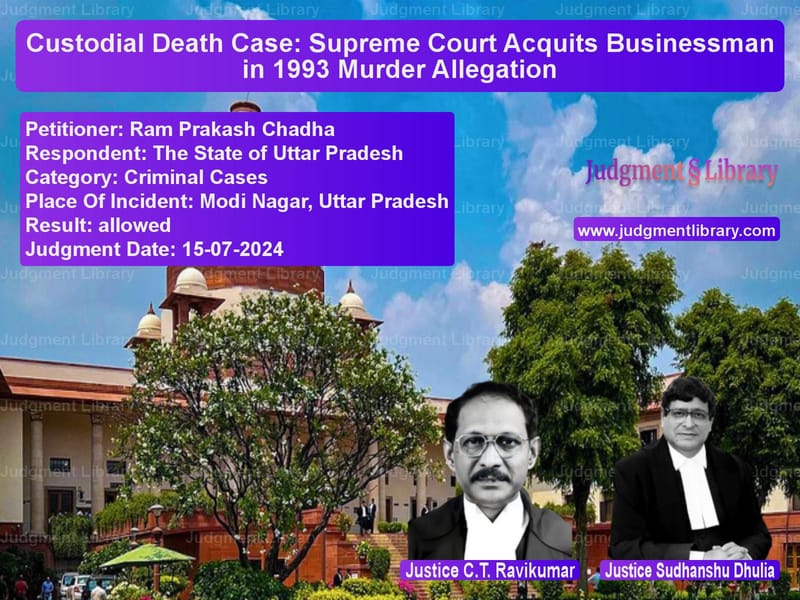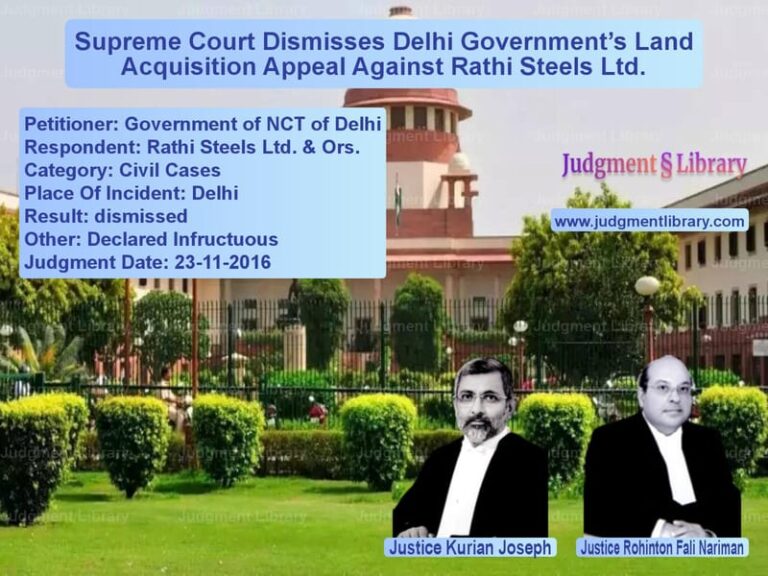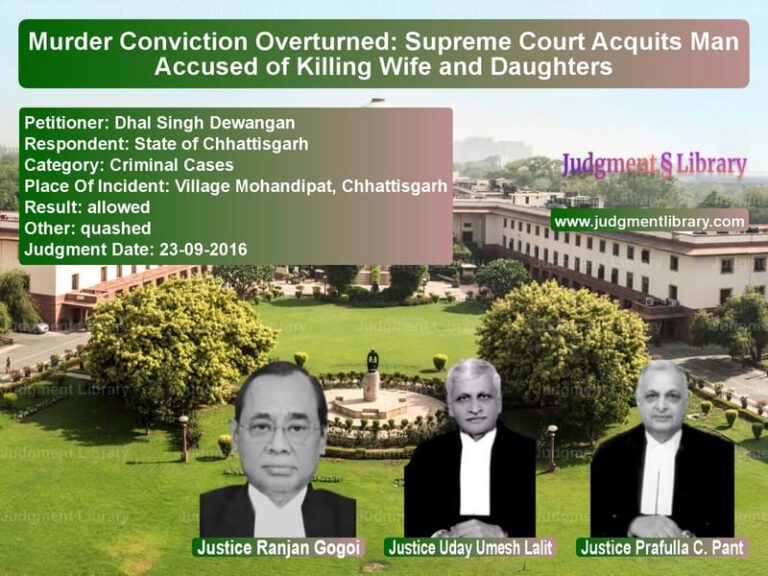Custodial Death Case: Supreme Court Acquits Businessman in 1993 Murder Allegation
The Supreme Court of India recently delivered a judgment in the case of Ram Prakash Chadha vs. The State of Uttar Pradesh, acquitting the appellant in a decades-old custodial death case. The case revolved around the 1993 death of Ram Kishore, an accountant, while in police custody, and the Supreme Court ruled that there was insufficient evidence to implicate the appellant in a criminal conspiracy.
Background of the Case
The case began with a complaint filed by the appellant, Ram Prakash Chadha, who owned a timber business. He alleged that his cashier, Ram Kishore, was robbed while collecting business payments. A First Information Report (FIR) (Crime No. 351/1993) was registered for robbery under Section 392 of the Indian Penal Code (IPC) at Modi Nagar Police Station, Uttar Pradesh.
Days later, the police detained Ram Kishore for interrogation, suspecting his involvement in the robbery. The interrogation lasted several days, and on July 23, 1993, he was taken to a hospital, where he died the following day. The post-mortem report indicated ante-mortem injuries, leading to allegations of custodial torture.
Following his death, a second FIR (Crime No. 371/1993) was registered for murder and other offenses against police officers. However, the investigating authorities also implicated the appellant, claiming he conspired with the police to detain and torture Ram Kishore.
Arguments by the Petitioner (Ram Prakash Chadha)
- The appellant was the complainant in the robbery case and had no role in the police’s actions.
- There was no evidence suggesting he conspired with the police to torture Ram Kishore.
- The police arrested Ram Kishore and kept him in custody without informing the appellant.
- The charge sheet failed to establish a criminal conspiracy or common intention between the appellant and the police officers.
- The trial court wrongly relied on circumstantial suspicion rather than concrete evidence to implicate the appellant.
Arguments by the Respondent (State of Uttar Pradesh)
- The appellant was the one who called Ram Kishore to the police station for questioning.
- He filed the robbery case, leading to the police investigation and eventual arrest of Ram Kishore.
- The appellant filed another complaint after Ram Kishore’s death, blaming the police, which was suspicious.
- The prosecution alleged that the appellant’s actions indicated his involvement in a larger scheme with the police.
Trial Court and High Court’s Rulings
The trial court rejected the appellant’s discharge application in 2007, citing strong circumstantial suspicion against him. It ruled that:
- The appellant called the victim to the police station, which made him complicit in the events leading to his death.
- His immediate complaint against the police after the victim’s death was seen as an attempt to divert attention from his role.
- Even though the direct evidence was lacking, the court held that circumstantial evidence was enough to frame charges.
In 2023, the Allahabad High Court upheld the trial court’s decision, dismissing the appellant’s petition under Section 482 CrPC. The High Court ruled that the presence of “strong suspicion” was enough to proceed with trial.
Supreme Court’s Judgment
The Supreme Court examined whether the charge sheet and witness statements established a prima facie case of criminal conspiracy against the appellant. Key observations included:
- The appellant was originally the complainant in the robbery case and had no control over police actions.
- No evidence showed that he participated in the police’s decision to detain or torture the victim.
- The prosecution failed to establish an “agreement” between the appellant and the police officers to commit a crime, a key element of conspiracy.
- The trial court’s reliance on “circumstantial suspicion” rather than concrete evidence was legally flawed.
The Supreme Court ruled:
“A few bits here and a few bits there, on which the prosecution may rely, are not sufficient to connect an accused with the commission of the crime of criminal conspiracy.”
Referring to precedents, the Court reaffirmed that criminal conspiracy requires a meeting of minds and cannot be based on assumptions. The prosecution failed to demonstrate how the appellant conspired with police officers to cause the victim’s death.
The Court emphasized:
“A strong suspicion should be based on material evidence and should not be founded on mere conjectures or suppositions.”
Accordingly, the Supreme Court:
- Set aside the High Court’s order of 2023.
- Reversed the trial court’s rejection of the discharge application.
- Held that the appellant should not stand trial due to the lack of prima facie evidence.
Key Takeaways from the Judgment
- Burden of Proof in Criminal Conspiracy: The ruling clarifies that mere suspicion is not enough to implicate someone in a conspiracy.
- Discharge at Pre-Trial Stage: Courts must exercise caution in rejecting discharge applications without clear evidence.
- Protection Against Wrongful Prosecution: The judgment reinforces legal safeguards against wrongful implication in criminal cases.
- Limits of Circumstantial Evidence: The decision highlights that courts should not frame charges based solely on assumptions without direct evidence.
Conclusion
The Supreme Court’s ruling in this case is a reaffirmation of legal principles protecting individuals from wrongful prosecution. It ensures that criminal conspiracy charges require clear evidence of an agreement to commit an illegal act, preventing the misuse of legal provisions against innocent individuals. The case serves as a precedent for ensuring fair trials and upholding justice in custodial death allegations.
Petitioner Name: Ram Prakash Chadha.Respondent Name: The State of Uttar Pradesh.Judgment By: Justice C.T. Ravikumar, Justice Sudhanshu Dhulia.Place Of Incident: Modi Nagar, Uttar Pradesh.Judgment Date: 15-07-2024.
Don’t miss out on the full details! Download the complete judgment in PDF format below and gain valuable insights instantly!
Download Judgment: ram-prakash-chadha-vs-the-state-of-uttar-p-supreme-court-of-india-judgment-dated-15-07-2024.pdf
Directly Download Judgment: Directly download this Judgment
See all petitions in Custodial Deaths and Police Misconduct
See all petitions in Bail and Anticipatory Bail
See all petitions in Fraud and Forgery
See all petitions in Judgment by C.T. Ravikumar
See all petitions in Judgment by Sudhanshu Dhulia
See all petitions in allowed
See all petitions in supreme court of India judgments July 2024
See all petitions in 2024 judgments
See all posts in Criminal Cases Category
See all allowed petitions in Criminal Cases Category
See all Dismissed petitions in Criminal Cases Category
See all partially allowed petitions in Criminal Cases Category







